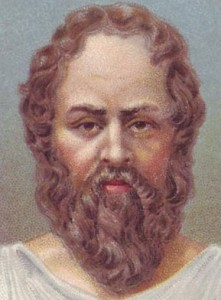Random Thoughts on The Apology of Socrates by Plato
It has been about two and a half years since I last read The Apology of Socrates, and I have taken a more methodical approach to reading it this time. It seems to me that the real essence of the Apology is the question, “What is wisdom?” Is it wise to continue to defy the authorities and be put to death? I think Socrates would say yes, as long as you are doing the good. Several times he said he would rather be poor or even die rather than stop helping people to examine their lives.
Is wisdom practical knowledge? It seems to me that it must be more than that. If Socrates is wise, as the Delphic oracle suggested, then wisdom must have something to do with an awareness of oneself as a learner or knower. Socrates’ life task was to find people with the reputation for wisdom and discover if they were indeed wise. His method was to question them, mostly on their assumptions and definitions. His big discovery, I think, is that most people don’t really think as much as they suppose they do. Most of our “thinking” is done on the surface, and can more accurately be described as judging too soon. If we call this kind of thinking “pre-judging,” then it is easy to see that the world is a very prejudiced place, with most people making decisions based on quick impressions and hasty generalizations, rather than on deliberate, careful consideration.
Why did the jury convict Socrates and sentence him to death? It seems to me it was because of their “prejudice” against him. They judged him based on their surface ideas, the ideas that they “inherited,” so to speak, from their culture. No doubt they thought that they were doing the right thing, but their beliefs came from incomplete reasoning or worse yet, from no reasoning at all.
Socrates decided to spend his life working with one person at a time, rather than trying to change the system. So did Jesus. He did not try to bring about major social change. He touched the lives of those around him, those closest to him. And he was executed for his efforts. Mother Teresa practiced the same philosophy: one life at a time, one poor person after another. Mortimer Adler felt the same way. He did not spend his time trying to reform the educational system, though he longed for it to change. He tried to make changes on a local scale.
Socrates (at least the idealized Socrates of the Apology) said over and over that to do the good is the most important thing–that death was not to be feared. He continued his life task, even after receiving his death sentence. Would that we all could have such courage and conviction.
































